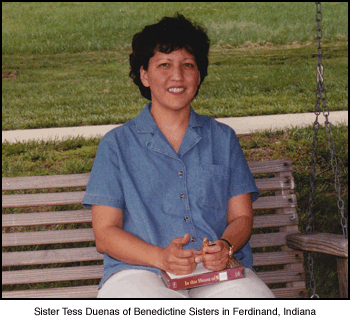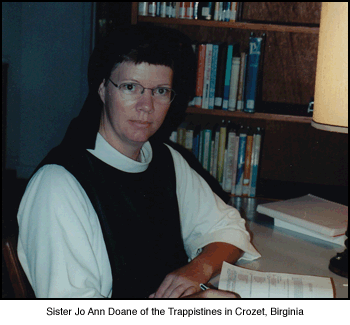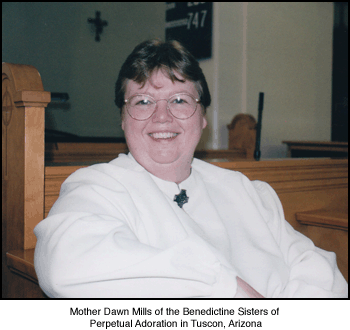


![]()

Excerpted from Chapter Six: “The Sensual Sisters,” Benedictines in Ferdinand, Indiana
Tess Duenas is forty-two, but she appears decades younger, with her short dark hair, jade green eyes, and suntan from gardening and running; I did a double take when I first spotted her jogging in shorts around the monastery.
She had initially considered—but then dismissed—becoming a sister in high school. At age twenty-seven, as she was about to enter graduate school, she felt a deep pang and knew she had to seriously consider religious life one final time. Her parents supported her for a year while she sorted out the issue.
Her biggest obstacle was celibacy.
Tess asked various sisters how they dealt with the physical longings. Some sisters joked that they took showers; others said they went for walks or sought physical activities. Others confessed celibacy was difficult at first but became easier as they got older.
The sisters’ honesty helped Tess see that living a celibate life takes courage, not belief in “special graces” or denying her humanity. For Tess, talking about her frustrations is more helpful than ignoring those feelings.
“It doesn’t seem as intense,” she said, then screamed: “Ahhhh! If I were to keep it in and be all quiet and secret about it, it would be frustrating. I find that it opens others to be free also and say, ‘You know, I feel that way, too. So let’s go for a walk, or let’s go play tennis.’
“I’m not going to deny it. I’m not going to stuff it,” she added. “It’s a matter of going and sharing our story with each other. We joke about it. That’s one tension-relieving way. We also cry about it and say, ‘You know, I’m just having one of those horny days, so watch out!’
“We’ve learned to find intimacy, and it doesn’t have to be sexual. I can be sitting with another sister in conversation talking at a very deep level and that would be so intimate. That’s what intimacy is: getting to the very core of who we are and to be able to share that.”
Excerpted from Chapter Seven: “A Divine Intimacy,” Trappistines in Crozet, Virginia.
Jo Ann Doane had spent more than a decade drinking and carousing. Her transformation from Marine truck driver to monastic nun is a complicated, mythical tale. She’d been baptized Catholic but her parents didn’t attend mass. As a teen-ager, she studied eastern religions and was captivated by a book about monks.
“God touched me through that book,” she said one afternoon as we sipped ice water in the monastery’s study cooled only by a ceiling fan. Despite her evenly plucked eyebrows, Jo Ann struck me as a perpetual tomboy. Her copper bangs are cut at a slant and her voice has a deep, masculine Southern twang, a Loretta Lynn drawl. “I wanted to be a monk on a snowcapped mountain in Tibet. That image carried me through eighteen years of living out in the world.”
Her desire for the divine, however, was overwhelmed with Jo Ann’s weakness for partying. After high school, she joined the Marines. Her father had been a career Navy man and she felt comfortable with military life. Her Marine job was in motor transport – driving jeeps, buses, and dump trucks. She also played left field for the Marine Corps slow-pitch softball team, traveling around the country competing against Army, Navy and Air Force women’s teams.
“I still drank and partied. I was having fun,” she said. “Nobody was living the spiritual life in the Marine Corps. Sometimes, when I would get drunk, I would talk to people about God. There was just an inner yearning that I was more free to express when I was drinking and wasn’t so inhibited.”
After her six years of active duty ended, Jo Ann tried to maintain her wild life while she worked jobs in lawn care, furniture refinishing and construction. When she was fired from her full-time construction job, she began delivering newspapers. Her new job forced her to go to bed at six p.m. and to rise around midnight. The work prevented her from partying and, while on her paper route, she began listening to a Christian radio program. Soon, Jo Ann started reading spiritual books. One day while reading about eastern religions, Jo Ann remembered her earlier desire to become a monk in Tibet and she was flooded with sadness.
“It really buried me in that moment, relinquishing a long-held memory, a dream that I wanted to fulfill since childhood that got swamped under the partying.”
For six months, Jo Ann continued listening to the radio announcer’s invitation for listeners to fall on their knees and ask God to instill Christ in their hearts. Then one night she stopped the car in the middle of a country road, kneeled on the gravel and prayed with the radio evangelist.
Excerpted from Chapter Twelve: “The Mystic Mother Superior,” Benedictine Sisters of Perpetual Adoration in Tucson, Arizona.
When Dawn Mills decided to become a nun at age twenty-two, she longed for an order that allowed women to sleep in. Knowing this desire was impractical, since all orders had morning prayers and usually morning mass, she settled on three criteria.
“I said to God: ‘I want a contemplative community, but they can’t be cloistered because I do not have the nerve to tell my mother I can’t come home, and we have to sit and talk through a grille from now on,’ ” she said, speaking in an almost theatrical flair. “ ‘Also, none of this getting up at three o’clock in the morning. Three o’clock is a fine way to end a beautiful evening. It is a lousy way to start a day. And no vegetarian communities; I am not giving up meat and men in the same lifetime! If I can’t have a man, I get to eat steak.’
” She let the words hang in the air as she tried to read my face for the shock she, no doubt, was accustomed to receiving from women unfamiliar with her progressive attitude. When she was elected in 1995, Dawn was the youngest nun in not only her community but the entire order. A hip superior at forty-two, Dawn was unlike any who had ever ruled at the sixty-five-year-old Tucson monastery. Leading the aging community with a sardonic wit and contemporary philosophies, Dawn quickly developed a reputation among area orders as a woman who said whatever she thought, sometimes startling sisters with her candor. Her Tucson sisters viewed her as a bit quirky, a collector of plastic unicorns and spiders and a Star Trek fan.
“I’ve been a Trekker longer than I’ve been a Catholic,” Dawn proudly told me, spreading her fingers to outline a V. “I mean I didn’t become a Catholic until 1972, and I’ve been watching Star Trek since 1964. Never missed a series or a movie.”
Dawn is the kind of mother superior I would have wanted had I chosen to become a nun. She makes religious life seem an adventure, a personal journey. There aren’t all the hierarchal levels I heard about from other nuns who speak of God in reverential tones as though they fear Him, worship Him, adore Him, but do not consider themselves pals. Dawn talks as though chatting with God is as casual as gossiping with girlfriends. She makes God seem like a friend and not the Darth Vader figure so many religious people portray Him to be. She also isn’t afraid of tackling the big questions and seeking out answers that are more realistic than theoretical. She is a friend of gay clergy and a public advocate for married priests and women priests. Dawn hasn’t swallowed Catholicism or religious life whole. Her spirituality incorporates the vows in an intellectual, philosophical way that makes sense. She has transcended the institutional culture and makes the vows both personal and relevant. In short, she is the coolest mother superior I’ve ever met, and in that moment I wanted to become a nun just so I could hang out with her.
© 2009 Unveiled, by Cheryl L. Reed. All rights reserved.



